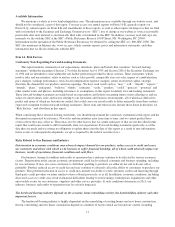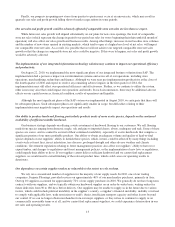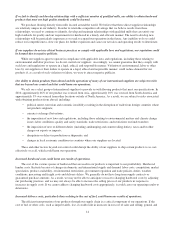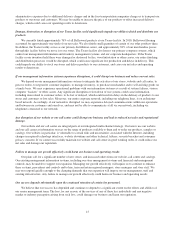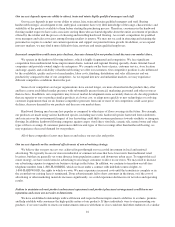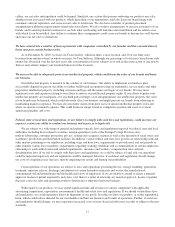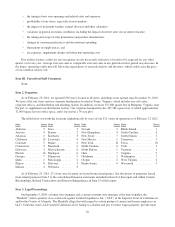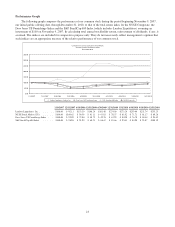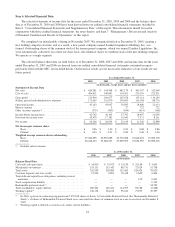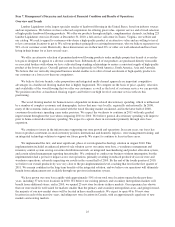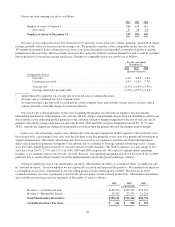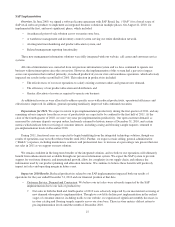Lumber Liquidators 2010 Annual Report Download - page 24
Download and view the complete annual report
Please find page 24 of the 2010 Lumber Liquidators annual report below. You can navigate through the pages in the report by either clicking on the pages listed below, or by using the keyword search tool below to find specific information within the annual report.We may incur costs resulting from security risks we face in connection with our electronic processing, transmission and
storage of confidential customer information.
We accept electronic payment cards for payment in our stores and through our call center. In addition, our online
operations depend upon the secure transmission of confidential information over public networks, including information
permitting cashless payments. As a result, we may become subject to claims for purportedly fraudulent transactions arising
out of the actual or alleged theft of credit or debit card information, and we may also be subject to lawsuits or other
proceedings relating to these types of incidents. Further, a compromise of our security systems that results in our customers’
personal information being obtained by unauthorized persons could adversely affect our reputation with our customers and
others, as well as our operations, results of operations and financial condition, and could result in litigation against us or the
imposition of penalties. A security breach could also require that we expend significant additional resources related to the
security of information systems and could result in a disruption of our operations, particularly our online sales operations.
Additionally, privacy and information security laws and regulations change, and compliance with them may result in
cost increases due to necessary systems changes and the development of new administrative processes. If we fail to comply
with these laws and regulations or experience a data security breach, our reputation could be damaged, possibly resulting in
lost future business, and we could be subjected to additional legal risk as a result of non-compliance.
The expansion of our store base to Canada may present increased risks due to our limited familiarity with that market.
In 2011, we plan to open store locations in Canada. The Canadian market may have different competitive conditions,
consumer tastes and discretionary spending patterns than our existing markets. As a result, new stores in that market may be
less successful than our stores in the United States. Additionally, consumers in the Canadian market may not be familiar with
our brand, and we may need to build brand awareness in that market through greater investments in advertising and
promotional activity than we originally planned. Furthermore, we have limited experience with the legal and regulatory
environments and market practices outside of the United States and cannot guarantee that we will be able to penetrate or
successfully operate in the Canadian market. We may also incur additional costs in complying with applicable Canadian laws
and regulations as they pertain to both our products and our operations.
Changes in accounting standards and subjective assumptions, estimates and judgments by management related to
complex accounting matters could significantly affect our financial results.
Generally accepted accounting principles and related accounting pronouncements, implementation guidelines and
interpretations with regard to a wide range of matters that are relevant to our business, including but not limited to, revenue
recognition, stock-based compensation, lease accounting, sales returns reserves, inventories, self-insurance, income taxes,
unclaimed property laws and litigation, are highly complex and involve many subjective assumptions, estimates and
judgments by our management. Changes in these rules or their interpretation or changes in underlying assumptions, estimates
or judgments by our management could significantly change our reported or expected financial performance.
Our insurance coverage and self-insurance reserves may not cover future claims.
We maintain various insurance policies for employee health, workers’ compensation, general liability and property
damage. We are self-insured on certain health insurance plans and are responsible for losses up to a certain limit for these
respective plans. We continue to be responsible for losses up to a certain limit for general liability and property damage
insurance.
For policies under which we are responsible for losses, we record a liability that represents our estimated cost of claims
incurred and unpaid as of the balance sheet date. Our estimated liability is not discounted and is based on a number of
assumptions and factors, including historical trends, actuarial assumptions and economic conditions, and is closely monitored
and adjusted when warranted by changing circumstances. Our history of claims experience is not extensive and our
significant growth rate could affect the accuracy of estimates based on historical experience. Should a greater amount of
claims occur compared to what was estimated or medical costs increase beyond what was expected, our accrued liabilities
might not be sufficient and we may be required to record additional expense. Unanticipated changes may produce materially
different amounts of expense than that reported under these programs, which could adversely impact our results of
operations.
18





